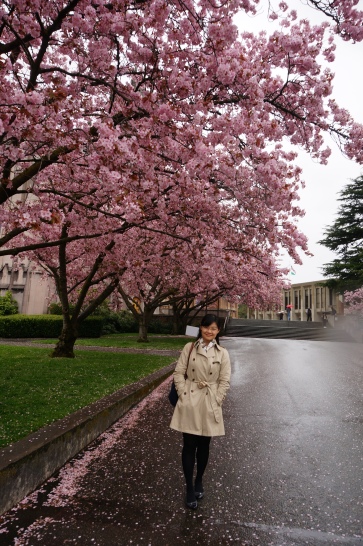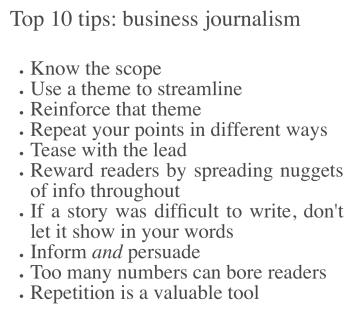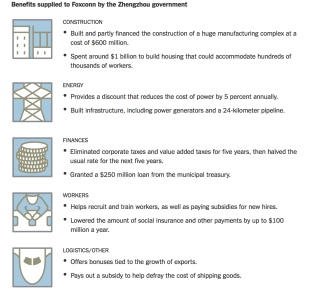(Above image: Duan in a library at the University of Washington — Photo courtesy Xiaolin Duan)
Xiaolin Duan thinks it’s strange that so many Americans see China as a restrictive communist state. She would say that it’s quite the opposite. And she would know. Duan spent her whole childhood there — all the way through college — before moving to the United States for graduate school.
Duan has worked as a history professor at Elon University since 2015, but the journey she took to get to the little brick-strewn campus has been far from typical. Duan grew up in Xi’an, a city of eight million people in northwestern China. Studying Chinese history and culture as an undergrad in Beijing, she elected to go overseas to the University of Washington in Seattle to pursue her PhD in 2008.
She came to the United States because American teaching of Chinese history has a more social and cultural focus than its Chinese counterpart. As she’s spent time studying and teaching Chinese culture, though, she’s learned a bit about American culture along the way.
“It’s a society that really values individualism and independence,” Duan said. “It’s a society where if you have some request, you should speak up. In China, traditional values say you should hold it back. There are less social rules in the U.S.”
Starting, struggling, staying
Although she’s had some time to adjust since she first got here, the jump from China to the U.S. wasn’t necessarily an easy one at first. Duan struggled in the classroom, where her English language skills weren’t always able to catch up with her thinking. She also struggled outside the classroom, though, as she and her friends — also Chinese expats studying abroad — had differing ideas about life in America.

The two other students she lived with, a guy and a girl who came with her from the same university in China, would talk about their lives in the U.S. over dinner. Her female friend suggested that in order to integrate smoothly, they should talk and socialize mainly with American students. Her male friend argued that the time they spent with American students in the classroom was more than enough, and that they needed to maintain their ties with their homeland by hanging out with other Chinese students at UW.
“At one point,” Duan said, “I would speak Chinese to my friend and she would speak English back at me. And we both found it okay. And we did that for months.”
Now, though, she’s settled down a long way from Seattle, and a world away from Xi’an. Her first stop after leaving Seattle was Luther College, a small school of about 2,000 students, tucked away in the cornfields of Northeast Iowa. After just a year there, she rerouted to Elon.
Duan originally moved to Burlington when she got the job at Elon, but didn’t stay in Alamance County for long.
“Everyone is so friendly,” Duan said, “but I just felt that I may not belong in Burlington. It wasn’t very obvious for the first semester, but in my second semester I started to feel this calling from Chapel Hill and Durham. So I moved there last November and now I feel like I’m living in a community where half of the people are international.”
Having settled in to a community where she is comfortable, Duan has had some time to reflect on the nine years she’s spent living in the United States.
In the beginning, she noticed the little differences between life on each side of the Pacific.
“For the first couple months,” said Duan, I was really concerned and bothered that there is no food — especially street food — after nine p.m. If I’m craving some food after nine, instant noodles seemed to be the easiest choice, and that bothered me.”
But now, she thinks about the things that have changed for Chinese people in the U.S. in the time that she’s been here. In 2008, Duan said, she and her friends barely talked about the election. Maybe they watched one of the debates, but they didn’t find much interest in American politics. This year, though, things have been much different.
Every night when she gets home, Duan sees her phone light up with hundreds of messages in group message chats with her friends, some Chinese expats in America, some still living in China. They like to talk about how the Chinese-American community handled the most recent election. It’s a topic, she says, that has split that community.
“Now we can see that we will stay in this society for a considerably long time, so we care more about what this society will turn into.”
Managing misconceptions
Duan has some other thoughts on American society, too. She thinks that it’s a little odd that so many Americans have this idea that China is a restrictive communist state. She teaches a class called “Western Imaginations of China”, and at the beginning of every semester, she asks her students about their pre-existing ideas of what life in China is like. And every year, students paint a picture of the “Red China” of years past. Years that ended before Duan was even born.
She says that this perception is about 85 percent stereotype.
“I never felt any restraints on what I could read or what I couldn’t read,” she said. “I remember my parents reading or watching the movies or books that were supposedly banned, but apparently we had ways to find that online.”
It certainly didn’t feel dangerous, either. Americans sometimes seem to focus on China’s apparent restrictions on what people can say and think. An example that is often brought up is the assumption that the Chinese government works hard to suppress all knowledge of the 1989 Tiananmen Square protests, an infamous demonstration that ended in the massacre of hundreds of Chinese civilians by government troops.
“I still remember something I know now but didn’t notice at the time,” said Duan. “One day my parents’ friends were visiting from Beijing and they first put me to bed. And before I fell asleep I remember overhearing my dad ask the friend in a lower voice, ‘Do you still remember the 1989 thing?’ And then I passed out. Now I’m thinking about how adults talk about this quite freely, they’re probably a little bit hesitant to have their kids know about it, but apparently there’s not much restriction of what they can talk about among friends.”

She doesn’t really know where Americans are getting the idea that China is still like the communist state it once was, but she actually thinks it’s kind of funny. While Americans like to talk about the fact that the Chinese government censors websites like Facebook and Google, Duan and her friends use the sites freely, and often joke that the Chinese government will send troops to their doors if they make any unapproved anti-party searches.
Her unique cultural situation, not only as a member of both cultures, but also as a teacher, has helped her bust stereotypes and misconceptions on both sides. Just ask David Fletcher, a colleague of hers in Elon’s history department.
“Having been here in the United States and having studied in the U.S., she brings the best of both worlds,” says Fletcher. “She has a foot in China, and has her heart there, but at the same time she also has a perspective from the west and can speak to western students and Asian students to bridge misunderstandings for the both of them.”
A past in two worlds, a future in one
While she’s had plenty of time to think about how her life has changed since moving to the U.S., her roots are in China, and sometimes she can’t help but think about going back. Her husband Wei, another Chinese native living in the United States, is a professor at Oakland University in Michigan. While their short-term plans keep them in the United States, they talk about the potential of closing the physical distance between them going back to their homeland to start a family.
The two don’t have any children yet, but they go back and forth on where they’d rather raise a kid. She’s found pros and cons for both countries. Duan says that her high school years were some of the unhappiest of her life, and she’s not sure she’d want to put her own child through the Chinese education system. She also considers the idea that her children could have some identity issues growing up Chinese in the U.S.
Although Duan thinks about her decision with a future family in mind, she’s also torn on which country would best suit her own life. Before coming to the U.S. for school, she had always planned on moving back to China after graduating. But now, with almost seven years of her adult life spent in the states, she wonders if that would make the most sense.
“I started my independent life here in the U.S. I’m more familiar with this social system, rather than how to survive in a big city in China,” said Duan. “I know it sounds funny, but I’d feel even more nervous about going back than finding another job here.”
She says that her parents and her roots are back in China, but her friends, husband, and

career are in her second home. Both Duan and her husband are only children, meaning that they may have to take care of their parents as they get older, but the U.S. would be hard to leave after having settled in.
To make matters more confusing, she’s unsure which country would be a better place to further her career in academics. Some of her American colleagues warn about the limitations of pursuing academics in China, saying that censorship can get in the way of anyone studying history. But at the same time, some of her friends in China have told her that the she’d have nothing to worry about.
Even staying in the U.S. as an academic could present some issues, she said. Duan worries that recent attitudes and actions towards immigrants could cause trouble. While she has a green card, she wonders if another executive order on immigration could stop her from coming back in if she ever left. In that hypothetical, she wonders if she’d even want to come back.
Duan’s situation has certainly given her a lot to think about, and it’s not quite clear when she might come to a decision. This summer, she and Wei are going back to China to look at job opportunities. But for now, she says that wherever she ends up, she enjoys the opportunity to have lived in two different societies.
“It’s a great experience to live in two cultures and be able to compare the two cultures on a level I didn’t expect,” said Duan. “There are certain challenges to living in a foreign country, and I think those challenges make me a better person.”




